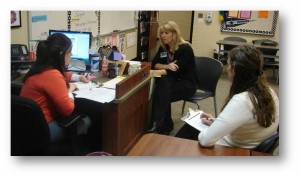 The National Center for Literacy Education (NCLE) recently published a report called “Remodeling Literacy Together: Paths to Standards Implementation.”
The National Center for Literacy Education (NCLE) recently published a report called “Remodeling Literacy Together: Paths to Standards Implementation.”
NCLE, which is a coalition of literacy organizations that includes the American Association of School Librarians, the International Reading Association, National Council of Teachers of English, and others, conducted a national survey of over 3,000 teachers to learn about their preparation and confidence related to implementing the Common Core State Standards (CCSS).
Whether or not you teach in a CCSS state, the findings of this survey should be of interest to everyone in the field of education. Every state, district, and school in the U.S. is placing an increased emphasis on raising the rigor in literacy teaching and learning. There are many leadership opportunities for school librarians in these findings.
• Nationwide, teachers feel ill-prepared to help their students achieve the new literacy standards (NCLE).
I believe that all educators feel challenged to teach literacy skills. We know students need to master traditional literacy skills as well as 21st-century skills. This is a tall order when many children do not arrive at school with rich literacy backgrounds, need on-going support for applying reading comprehension strategies across genres, content areas, and grade levels and need to learn how to effectively use technology tools to interact with information and produce knowledge. This is a tall order.
Who can help? A 21st-century school librarian!
• Working with peers is the most valued support for standards implementation (NCLE).
As a long-time collaborating librarian, this finding does not surprise me. I know that my colleagues and I have benefited tremendously through coteaching. The extra challenge for classroom teachers is that it is difficult for them to work with one another during the school day in order to achieve true job-embedded professional development. If educators combine classes, they have twice as many students whose needs they must meet. And few administrators have the flexibility to release teachers from their primary teaching responsibility so they can coteach with their peers.
Who can help? A 21st-century school librarian who can coplan and coteach with classroom teachers in real-time, with real students, real curriculum, real resources, real supports, and constraints of the actual teaching environment can be the peer with whom classroom teachers work. Through coteaching, we can help classroom teachers meet their need for standard-based lesson implementation and improve our literacy teaching practices together.
• Time for working together in schools is decreasing (NCLE).
This is an ill-advised situation that school-level and district-level administrators should pay attention to and address. When new standards or initiatives are introduced into a learning community, educators need to break out of the isolation of their classrooms, labs, and libraries in order to ensure that innovations spread throughout the learning community.
Who can help? A 21st-century school librarian has expertise in using technology tools for asynchronous collaboration. Using Google Drive docs, wikis, and other Web 2.0 tools to conduct collaborative planning can provide effective venues for working together when face-to-face time is short or not readily available.
On Thursday, I will respond to some of the additional findings of this important data from the field.
Works Cited
“Remodeling Literacy Learning Together: Paths to Standards Implementation.” Literacy in Learning Exchange. 18 Feb. 2014. Web. 31 Mar. 2014. <http://www.literacyinlearningexchange.org/remodeling-together>.
Coplanning Photograph of Librarian Stacy Cameron and her Colleagues – Used with Permission
